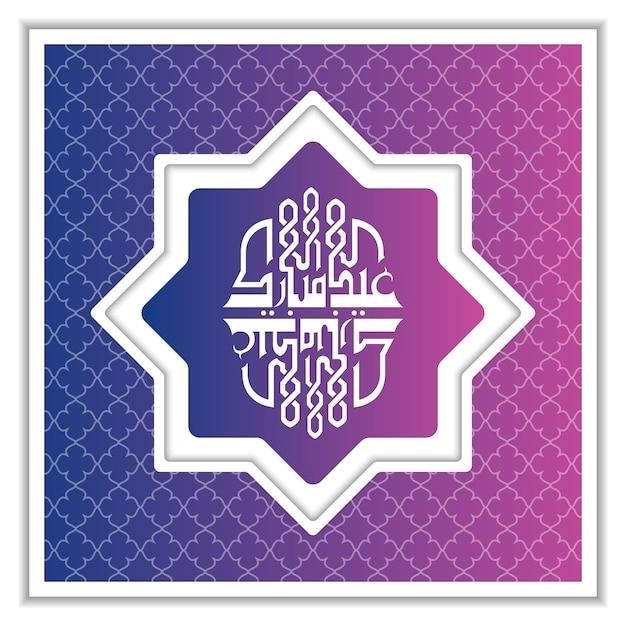Finding and Utilizing “99 Names of Allah” PDFs
Numerous online resources offer PDFs containing the 99 Names of Allah, ranging from simple lists to beautifully calligraphed versions. These PDFs provide convenient access for learning and reflection, offering diverse presentation styles to suit individual preferences. Many freely available options exist, but verifying authenticity and accuracy is crucial. Exploring various sources will help you find the perfect PDF for your needs.
Available Online Resources
Locating PDFs of the 99 Names of Allah is surprisingly easy; a simple online search yields numerous results. Websites dedicated to Islamic studies often feature downloadable PDFs, sometimes offering both Arabic script and English translations. Many are free, while others may require a small fee or registration. Digital libraries like the Internet Archive may also host such PDFs, though availability can fluctuate. Remember to check the source’s reliability; ensure the translations are accurate and the Arabic script is correctly presented. Some websites offer PDFs with accompanying audio files for recitation practice, enhancing the learning experience. Consider whether you need a simple list, a version with detailed explanations, or one featuring intricate calligraphy. The choice depends on your learning style and intended use; Exploring several sources increases your chances of finding a PDF that perfectly suits your needs and preferences.
PDF Formats and Accessibility
The accessibility and format of “99 Names of Allah” PDFs vary considerably. Some PDFs are simple, single-page lists of the names in Arabic script, perhaps with transliterations. Others provide more elaborate presentations, including English translations, detailed explanations of each name’s meaning and significance, and even accompanying audio files for pronunciation practice. The visual appeal also differs; some PDFs are plain text documents, while others utilize elegant calligraphy or incorporate relevant imagery. Accessibility features, such as text-to-speech compatibility or options for adjusting font size, are not always included. Consider your needs when choosing a PDF; if you require a visually engaging resource, look for PDFs with high-quality images and calligraphy. If you need an easily readable format for those with visual impairments, prioritize PDFs with adjustable text settings or those compatible with screen readers. Furthermore, the file size is a factor, with larger files potentially taking longer to download or requiring more storage space. Evaluate these aspects to find a PDF that best meets your specific requirements and preferences for usability.
Calligraphy and Presentation Styles in PDFs
The aesthetic presentation of “99 Names of Allah” PDFs varies significantly, impacting the overall learning experience. Some PDFs present the names in simple, straightforward Arabic script, prioritizing clarity and ease of reading. Others showcase intricate calligraphy, transforming the names into works of art. These calligraphic styles often reflect different artistic traditions and cultural influences within the Islamic world. The choice of font, color palette, and layout contributes to the overall visual appeal. Some PDFs integrate the Arabic script with English translations and transliterations, facilitating understanding for non-Arabic speakers. Others may include additional elements such as relevant verses from the Quran, hadith, or explanations of each name’s attributes. Images, such as illustrations or symbolic representations, can enhance the visual richness and spiritual connection. The layout itself can vary, ranging from simple, single-page displays to more complex designs with multiple pages or sections. Consider your personal preference for visual style and learning approach when selecting a PDF. A visually appealing design can enhance memorization and reflection, while a simpler layout might be more practical for quick reference.

Learning and Memorizing the Names
Effective memorization techniques, such as spaced repetition and using flashcards, can aid in learning the 99 names. Many apps and digital resources are available to assist in this process. Supplementing with audio and visual aids enhances retention.
Effective Memorization Techniques
Mastering the 99 Names of Allah requires a strategic approach to memorization. Spaced repetition, a proven technique, involves reviewing the names at increasing intervals. This combats the forgetting curve, ensuring long-term retention. Start by learning a few names daily, gradually increasing the number as you gain proficiency. A suggested method is to begin with 2-3 names per day, and progress to 5-7 once you feel comfortable. Flashcards, either physical or digital, are invaluable tools. Write the Arabic script on one side and the transliteration and meaning on the other. Regularly reviewing these flashcards reinforces your memory. Chunking, or grouping names thematically based on their attributes, improves comprehension and recall. Active recall, a powerful technique, involves testing yourself frequently without looking at your notes. This strengthens memory pathways. Combining these techniques, along with consistent practice, will significantly enhance your ability to memorize and retain the beautiful names of Allah.
Apps and Digital Resources for Learning
Numerous mobile applications and online platforms offer interactive ways to learn the 99 Names of Allah. These digital resources often incorporate multimedia elements to enhance the learning experience. Many apps provide audio pronunciations of the names in Arabic, alongside their English translations and meanings. Some apps feature interactive quizzes and games to test your knowledge and make learning engaging. These digital tools often include beautiful calligraphy displays of the names, enhancing both memorization and appreciation. Online resources may offer downloadable PDFs, audio files, and even video lectures explaining the significance of each name. The availability of these diverse resources caters to different learning styles and preferences. Choosing an app or online platform that aligns with your learning style and technological comfort level is important for effective learning. Remember to verify the authenticity and reliability of the source before utilizing it extensively.
Using Audio and Visual Aids
Incorporating audio and visual aids significantly enhances the memorization and understanding of the 99 Names of Allah. Listening to audio recordings of the names, recited with proper pronunciation, aids in familiarizing oneself with the sounds and rhythm of the Arabic language. Many online resources offer such audio files, often accompanied by translations and explanations. Visual aids, such as beautifully calligraphed PDFs or videos displaying the names with their meanings, can further strengthen memorization. The visual appeal of elegant calligraphy can make the learning process more engaging and memorable. Videos often incorporate animations or other visual elements that illustrate the attributes represented by each name, adding depth to comprehension. Combining audio and visual aids provides a multi-sensory learning experience, which is proven to be more effective than relying on a single modality; This approach caters to diverse learning styles, making the process more accessible and enjoyable for individuals. Remember to select high-quality, reliable resources to avoid misinformation.

The Significance of the 99 Names
Reciting and reflecting upon the 99 Names of Allah (Asma ul-Husna) offers profound spiritual benefits. Understanding these attributes deepens faith and connection with the Divine. Regular recitation brings peace and tranquility, enriching one’s Islamic practice.
Understanding the Attributes of Allah
The 99 Names of Allah, or Asma ul-Husna, are not merely labels; they represent the multifaceted attributes and perfections of God. Each name unveils a unique aspect of His divine nature, offering a deeper comprehension of His boundless power, infinite mercy, and absolute justice. For instance, Ar-Rahman (The Most Gracious) and Ar-Rahim (The Most Merciful) highlight His boundless compassion, while Al-Malik (The King) and Al-Quddus (The Holy) emphasize His sovereignty and purity. Studying these names individually and collectively reveals the richness and complexity of Allah’s being, moving beyond simplistic understanding to a more profound and nuanced appreciation of His majesty.
Understanding these attributes helps Muslims connect with God on a deeper level, fostering a stronger sense of awe, reverence, and devotion. The names serve as a constant reminder of Allah’s presence and His involvement in all aspects of creation and human life. By contemplating these names, Muslims gain insight into the divine plan and purpose, further strengthening their faith and commitment to Islamic principles. Engaging with the 99 names transforms them from mere words into a pathway towards spiritual growth and a closer relationship with the Almighty.
The Spiritual Benefits of Recitation
Regular recitation of the 99 Names of Allah offers a multitude of spiritual benefits for Muslims. The act of remembrance (dhikr) itself brings peace and tranquility to the heart, fostering a sense of connection with the divine. Repeating these sacred names strengthens faith and deepens devotion, allowing for a more intimate relationship with God. Each name carries its own unique energy and spiritual significance, leading to a multifaceted spiritual growth and transformation. The recitation can act as a powerful shield against negative influences and provides strength during challenging times.
Many Muslims find solace and comfort in reciting these names, particularly during moments of distress or uncertainty. The constant remembrance of Allah’s attributes brings inner peace and a sense of security, fostering resilience in the face of adversity. Furthermore, the recitation can serve as a powerful tool for self-reflection, prompting introspection and a deeper understanding of one’s own spiritual journey. The process cultivates humility and gratitude, enhancing the overall spiritual well-being of the individual. The consistent practice of this devotion is believed to lead to increased spiritual awareness, a refined character, and a greater capacity for empathy and compassion.
The Names in Islamic Practice
The 99 Names of Allah (Asma ul-Husna) hold a significant place within various aspects of Islamic practice. They are frequently invoked during daily prayers (Salah), providing a deeper connection with God during worship. Many Muslims incorporate the names into their personal supplications (Dua), seeking divine blessings and protection; The recitation of specific names is often associated with seeking particular divine attributes, such as seeking forgiveness through the name Al-Ghaffar (The Forgiving) or guidance through Al-Hadi (The Guide).
The names are also used in various Islamic rituals and ceremonies, including blessings and invocations. Some Muslims wear amulets or talismans inscribed with these names, believing in their protective power. The study and contemplation of the names is considered a form of spiritual enrichment, leading to a greater understanding of God’s attributes and His relationship with creation. The Asma ul-Husna are not merely a list of names but a pathway to a deeper understanding of the divine essence and a means of drawing closer to God through constant remembrance and reflection. The consistent engagement with these names enhances the spiritual life of a Muslim.